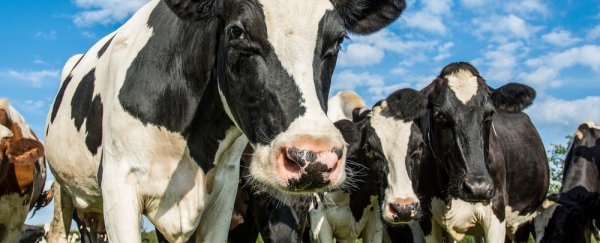The good news here is that over the past decade, the amount of trees we've cut down for wood or to clear land has declined. But, unfortunately, the environmental benefits of those improvements are almost being cancelled out by our efforts to feed the world's rapidly growing population, a new study has revealed.
An international team of scientists, led by the Food and Agriculture Organisation of the United Nations, has analysed three datasets available from the Intergovernmental Panel on Climate Change (IPCC) Fifth Assessment Report, and found that, in 2010, agriculture contributed around 11.2 percent of all greenhouse gas emissions.
Publishing in Global Change Biology, the team explains that this means it now does more damage, climate change-wise, than deforestation, which for years has been pinpointed as one of the worst environmental activities.
"Deforestation was responsible for only 8 percent of total anthropogenic emissions in 2010, compared to 12 percent in the 1990s," the researchers write.
"We're seeing an expansion of agricultural lands in some areas because of the growing global population," Rob Jackson, who is a co-chair of the Global Carbon Project, told John Upton from Climate Central. "We're also seeing intensification of agriculture."
According to the study, the greenhouse gases released by farming have risen 13 percent since 1990 - as a result of methane from livestock and rice paddies, and nitrous oxides from fertilisers and other soil chemicals.
However, despite the growing impact of agriculture on climate change, it's not something that policy makers have paid much attention to, writes Upton.
"While United Nations climate negotiations focus heavily on forest protections, the researchers note that delegates to the talks ignore similar opportunities to reform farming," explains Upton over at Climate Central.
The research revealed that meat - in particular our love of beef - as well as dairy, is one of the worst offenders when it comes to food. In fact, as Upton reports, livestock produces so much methane and eat so much fertilised feed that they're responsible for around two-thirds of agriculture's climate pollution every year.
So what's the answer? While more people going vegetarian would definitely help, Doug Boucher, the director of climate research at the Union of Concerned Scientists, told Upton that we can also reduce agricultural emissions by reducing fertiliser use, keeping our soils healthier and changing the way we flood rice paddies could all help.
"Shifting consumption toward less beef and more chicken, and reducing waste of meat in particular, are what seem to have the biggest potential," Boucher told Upton.
But despite the importance of reducing the impact of agriculture, as well as keeping deforestation down, Upton reminds us that there is still one big factor that does more damage than anything else:
The study is also a reminder that the burning of fossil fuels remains the main cause of global warming. Burning fuel produces about four times more climate pollution every year than forestry and agriculture combined - a figure that is growing.
Read the full feature on the report over at Climate Central.
Source: Climate Central
